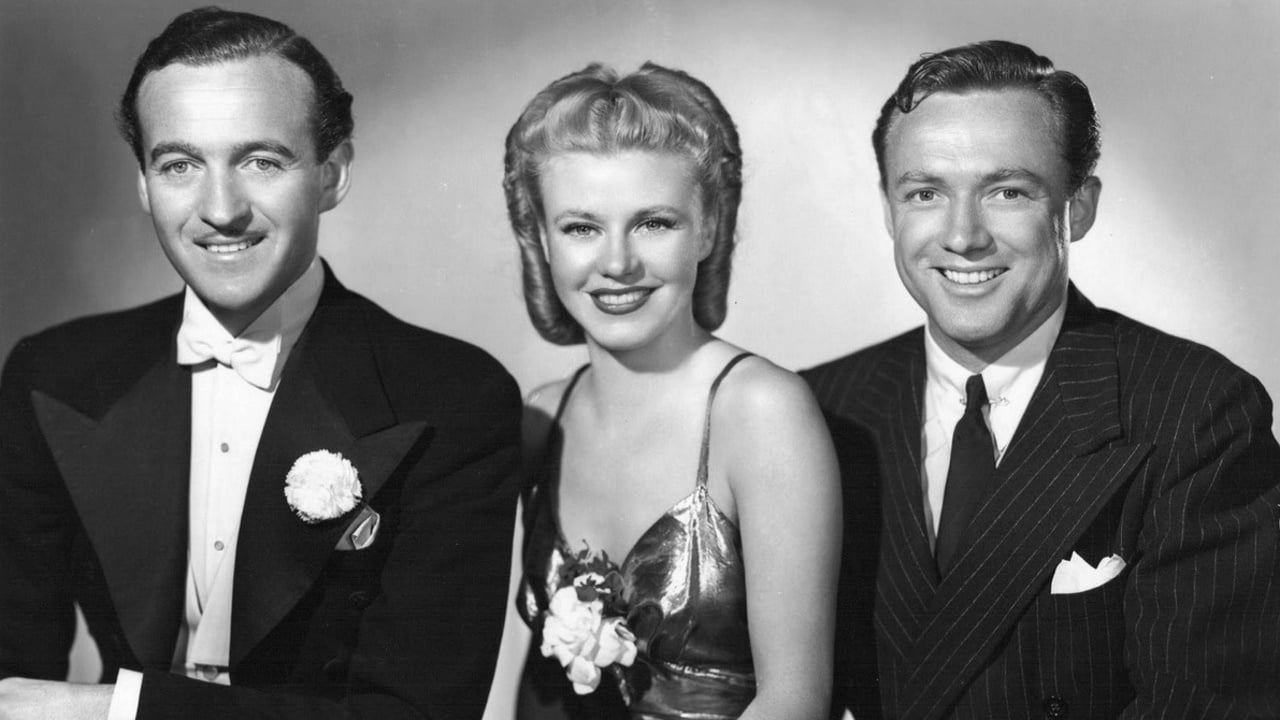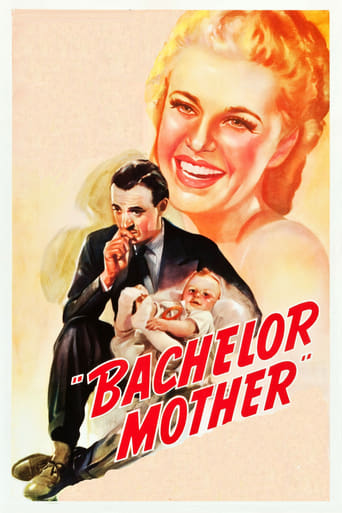

Load of rubbish!!
... View MoreAll of these films share one commonality, that being a kind of emotional center that humanizes a cast of monsters.
... View MoreEach character in this movie — down to the smallest one — is an individual rather than a type, prone to spontaneous changes of mood and sometimes amusing outbursts of pettiness or ill humor.
... View MoreThis film is so real. It treats its characters with so much care and sensitivity.
... View MoreA delightful Romantic Comedy with its non-sticky romance embedded nonchalantly within one of the funniest comedies that I've ever seen is BACHELOR MOTHER. Actually, outside of the best of the Marx Brothers, and maybe THE AWFUL TRUTH, I can't think of a more consistently funny movie. Perhaps not the best comedy ever made (I doubt that it really has very much to say about unwed motherhood, for example, and any other deeper meanings remain, shall we say, not especially evident), but it's close to a perfect example of its kind and the wonder is that it's not far better remembered. Perhaps history has simply lost it among the many excellent and more ambitious movies of 1939. BACHELOR MOTHER didn't go unnoticed at the time, it was both RKO's biggest hit of the year and Hollywood's most popular comedy. And maybe this pure vehicle for Ginger Rogers (she hadn't had many up to this point in her career. Only VIVACIOUS LADY and PROFESSIONAL SWEETHEART come to mind) has been obscured by her continuing fame as Fred Astaire's dancing partner. If so, it's a shame. BACHELOR MOTHER simply begs rediscovery as a forgotten Holiday Classic. The story begins on Christmas Eve and ends on New Year's Day and includes the most charming and funny and touching New Year's Eve sequence that you could ever imagine.1937-38 had brought on a second leg of the Depression with unemployment again breaching the 20% mark, so Polly Parrish's (Ginger Rogers') predicament at the beginning of the film (ironically laid off immediately after being wished a "very Merry Christmas" by the big boss, Charles Coburn) was an all-too-realistic plot device for its audience. It's hinted without ever quite being said that Polly is a recent orphan herself ("There's no one to go back to," she says when her friend suggests that she might return home), establishing a sympathetic parallel between her and the infant with whom she'll soon be unwillingly bonded. For Polly is no more a willing volunteer for motherhood than you or I would be in similar circumstances, but the consequences for a single girl unemployed in New York City in 1939 were ominous, indeed. So she makes lemonade out of lemons and winds up Cinderella at the ball in the finest screwball tradition. Ginger's deadpan approach to Polly's sentimental journey provides just the touch of astringency needed. Neither her growing love for the baby nor for that bigger baby (David) ever grows the least bit gooey.Within the scenes, Garson Kanin's direction is relatively staid and relaxed, as befitting a movie about a mother and child, but the scenes themselves rush forward breathlessly, its set-pieces practically falling one on top of another: David's smug satisfaction at reuniting 'mother and child'; the dance contest at the Pink Slipper; the feeding lessons according to 'Dr. Eaglefoot, or Eagleface, or whatever his name is"; the entire New Year's Eve sequence, "Schmorgen!"; "I don't care who the father is, I'm the grandfather!", etc. Just typing it all out brings a smile to my face.This was Ginger Rogers' first film after the series with Fred Astaire had ended at RKO and she was never better (often different, but never better). If her star wasn't secure before BACHELOR MOTHER, it certainly was afterwards. And if anything, BACHELOR MOTHER was an even more important film for David Niven, for though he wasn't the one to carry the movie, this was probably his most important role to date. He'd been largely a supporting actor to this point, notably in serious movies (THE DAWN PATROL, WUTHERING HEIGHTS), but BACHELOR MOTHER proved him a natural both for comedy and romance. For Charles Coburn, BACHELOR MOTHER was simply one more triumph in what was still relatively early in his brilliant movie career.Ironically, Ginger Rogers didn't like the script and producer Pandro Berman, who must have had plenty of confidence in the project, literally had to force her to do the picture. She did seem to enjoy the experience of working on it once she got to the set, however, and established lifelong friendships with Niven and director Kanin. I suspect that most actors aren't the best judges of what projects are best for them, but it's fitting that a film as delightful as BACHELOR MOTHER worked out so well for everyone involved.
... View MoreDepartment store clerk Polly (Ginger Rogers) is mistakenly believed to be the mother of an abandoned baby. She has to go along with it to keep her job. David Merlin (David Niven), the son of department store owner J.B. Merlin (Charles Coburn) takes a special interest in Polly's situation. Gradually the two fall in love but things are further complicated when J.B. is led to believe David is the father of Polly's baby.Delightful romantic comedy with wonderful performances from Ginger Rogers, David Niven, and Charles Coburn. Special mention for Frank Albertson in one of his better roles outside of playing Sam "Hee Haw" Wainwright in It's a Wonderful Life. Donald Duck also figures into things in an amusing way. I actually heard the radio version of this before I saw the movie. I heard it on satellite radio several years ago. It featured Ginger and David reprising their film roles. This is a fun, nicely-paced movie with an immensely likable cast that seems to be having a great time. Ginger fans certainly won't want to miss it as it's one of her best.
... View MoreYou might expect something different from a synopsis. A baby is left on shop girl Ginger Rogers' doorstep. Everyone assumes she is the mother, including her wealthy boss, David Niven. Rogers and Niven are at odds with each other but shortly the inevitable happens. In addition to everyone's mistaken assumption that Rogers has had a (gulp) illegitimate child, there are various schemes to align her status as mother with her actual pristine character.I had plenty of handkerchiefs handy for when the plot slowed down for the drama and sentiment -- the cute little baby doing cute things, Rogers sobbing over her undeserved shame, everyone hugging the tot and weeping with love. Actually, I don't own any handkerchiefs, so I had paper towels at the ready. I didn't need them anyway. It's pretty funny.There are amusing incidents (a disguised Niven trying to exchange a faulty toy duck at the store he owns)and comic plot twists that end up with several men claiming to be the father.But it's a quiet comedy -- the screenplay is by Norman Krasna and the direction by Garsin Kanin -- no pratfalls and very little shrieking. It's done in a lower key than, say, the Doris Day/ Rock Hudson comedies but it travels on the same track. Instead of an obvious wise crack, we get someone muttering an ironic, "Ha ha." Ginger Rogers is really an attractive woman. She has oversized blue eyes and she can get an emotion across with a muted moue or a flick of her gaze. Niven is good, better at comic roles than dramatic. The supporting cast is at par, with Ferike Boros great as a stereotypical cheerful and loving grandmother, nurse, or housekeeper.If you get into it, you'll probably enjoy it.
... View MoreThis is yet another Depression Era take on Cinderella - not for nothing is is the David Niven character named Merlin - designed to take people's minds off both the recent austerity and the global war waiting in the wings. What comes across strongly is the sheer professionalism from all Departments, Script, Directing, Acting, that almost succeeds in preventing awkward questions - the film begins on what Americans insist on referring to as 'the day before Christmas', known to the rest of the world as Christmas Eve, with Ginger Rogers being made redundant from her temporary salesperson position at Merlin's Department Store; due to plot machinations the son of the owner of the store (David Niven) is moved to reinstate her and the continuity implies that she goes back to work the next day (Christmas) - etc. The character played by the reliable and prolific Frank Albertson (so memorable in It's A Wonderful Life) fluctuates between up and down like a dysfunctional yo-yo but it's a safe bet that no one in 1939 noticed any of this and were content to bask in the high Enjoyment factor. Even today it holds up pretty well if only perhaps for one first-time viewing.
... View More